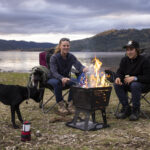Give your dog the best life when you go on a holiday – in home pet boarding is so easy! Following is a guide to how a sitter will take care of all of your dog’s needs, and how you can make this happen in time for your next travel trip.
In home pet boarding – what is it?
Cooper and I are currently on a ‘slow travel’ trip around the UK and Europe. We started house and dog sitting in London. Those city sits were short sits, and now we’re on a journey of a series of long sits that started in Northampton, have taken us to Ireland and soon France and Malta. You’ll see from our content that we are big dog people. The same goes for most of those signed up to a reputable in home pet boarding service like TrustedHousesitters.
If you can’t travel with your pooch to a pet hotel or utilise any other pet care travel options, a house sitting service may be for you.
In home pet boarding means that your pets can stay in their own environment while you’re away. Research shows this is far better for their wellbeing and state of mind. And, there’s no shortage of ‘animal people’ who are happy to visit your place, stay and take care of the fur babies.
It’s cheaper than you might think too. Most sites charge a fee per year which allows for background checks on home owners and sitters, and for the running of a site that helps us find good matches.
Special needs? No worries
Over the past few months we’ve learnt a LOT about different dogs and their needs. We’ll admit, we have been a bit surprised by the range of personalities we’ve met.
It’s been such a great experience to meet home owners and facilitate in home pet boarding for gorgeous dogs. We’ve got some insights to share, to show how seriously pet sitters take our jobs.
The range of needs taken care of by us as house and pet sit includes:
Anxiety
Many poor little dogs have anxiety. This may present through persistent barking (no, they’re not necessarily just being naughty!), fearful behaviours like retreating or tail between the legs.
We’ve experienced a range of dog anxiety, and it’s important that pet owners and sitters communicate any known needs or concerns. As our experience grows, we understand it’s really important to nurture dogs like kids. Reward them for good behaviour, and don’t write off defensive behaviour (like barking at another dog) automatically as a dog misbehaving. Sometimes it’s a protection mechanism. We take treats on walks with us and do whatever we can to ensure our dogs feel loved and safe.
Diets
Cooper and I understand it’s very important to respect the requests of pet owners, especially when it comes to their diet. Many pups are on a diet for their own health reasons. This may mean eating certain foods at a particular time of the day. We always abide by this, for the wellbeing of our fur babies.
Again, communication is critical. As a pet owner, write instructions down but discuss face to face if possible.
Medication
Another really important one. A fave pup of ours in the Cotswolds has been through a hip operation and has a heart murmur. He’s on specific medication three times a day. His mum was very helpful and thorough, sorting his medication into pill containers and also leaving us instructions and talking us through it.
As a sitter, we should be prepared to administer medication. We are experienced with dogs including our own, and know the drill, so we get on with it. You should be able to rely on your sitter to take good care of your pets, even if medication is required. We have a duty of care to them. (and it’s all totally fine by us)
Age (and associated abilities or health care requirements)
Cooper and I have had one instance where we looked after an old gentleman who suffered severe separation anxiety. This is normal for older dogs, although it was distressing to see him so upset.
Our strategy involved giving him ample time to himself, making sure he was eating and sleeping, and taking him out for walks when he got used to us. We did actually call the TrustedHousesitters advice line to ensure we were doing all the right things, which we were. Sometimes there’s no way around a dog being apprehensive. But, we know to give him/her space and still be around so they’re not alone. Of course, if sickness, trembling, no sleep or no eating kicks in, it’s time to contact the vet or emergency details left by the home owner.
In this instance, our little man’s parents were aware of his anxiety and had already taken him to the vet about it. They had also warned us he might struggle. We stayed in constant contact with them to keep them updated, and after a few days he did settle with us.
As far as other age-related issues go, always discuss how far a dog can or wants to walk each day, and what their overall abilities are like – how is their hearing or sight, for example?
Exercise and rehab
The same little man we took care of who needs his meds three times a day also needs rehab for his hip. This was a really rewarding experience for Cooper and I. The doggie’s mum went through five sets of exercises we needed to do with him, including a circuit in his back yard, leg lifts (like shaking his paw), and balancing activities.
This dog was so good and so diligent and we happily obliged.
Routine
They say routine is just as important for dogs as it is kids, and we’d agree (especially Cooper, a teacher by trade). Leave thorough instructions for your sitter as to what your pet’s routine is. If possible, chat through in person. Usually the dogs tell us when it’s time for their walk or dinner! But, it’s good to know what their usual day looks like, so it can be continued while their family is away.
Sight or hearing loss
Ok, so some pups have ‘selective’ hearing loss, we know that well! But others, particularly ageing dogs, start to lose some of their sight and hearing. This can lead to anxiety, or fright if they don’t know we’re around.
We have learnt to make sure we make noise or vibrations on the floor so as not to startle a pooch whose hearing is going. Similarly, we will ensure they see us properly. It can be hard enough with their parents gone – we make every effort to help them through and accommodate any special needs.
‘Personality differences’ between dogs
This is a classic that you’re likely to see on the street. Some dogs, like people, just don’t get along. Always make sure that any personality quirks are discussed between sitters and pet owners. One of our pup’s parent’s gave us a heads-up that their cute dog wouldn’t be behind the door at getting into a bit of an argument with others. They were right But we knew, and managed it. Again, communication and being up front about your dog’s personality is key, for their own wellbeing and bespoke care a sitter can offer.
As a home owner or pet sitter, do you have questions or tips to add? We’d love to hear from you in the comments below.






I need to know which service is the best from the ones listed on the site?
Hi there, thanks for your comment. What specific question do you have about the service(s)?
Great content! Thanks for all the work you put in!
Loved your article and the way you go about doing your job professionally and considerately. Indeed house sitting is not for everyone, only those love animals are cut out for this.
Great suggestions for pet sitters, can be really useful for new sitters. I have traveled a cup of times since I got my dogs and I never took them along anywhere but this time I considering to do so. As per my experience, pet sitters from barkindustries.com have always served to be super reliable and I was always welcomed with happy doggos when I got home. For anyone who wants to hire a sitter, I’d recommend doing some research and visiting them in person before making your pick, I have had a couple of bad experiences a few years ago with some pet sitters.
You have some great tips here about taking care of our senior pets! Nutrition is so important. The smaller size kibble helps very much with my two bichons!
Great read! Thank you for sharing this.
Susan David recently posted…Veterinarian Tips On How To Take Care Of Your Goldendoodle
Hello Sarah,
Glad to find your blog today and appreciate your blogging activity. I have a question. I am going to petsit a French Bulldog soon. Do you have any tips or tricks? It’s ok if you don’t. What things I have to consider first price or shape?
We’ve not sat for a French Bulldog before but my advice would be to get as many tips from the owner as you can about any special requirements or quirks that the little pup has. We also have other pet sitting advice on a playlist at youtube.com/travellivelearn :)
House sitting is a win win for both pet owners and house sitters. House sitters who are on a vacation get a comfortable place to live for free and pet owners are secured in the thought that their pets are being taken care of.
Ace recently posted…Classical Ehlers-Danlos Syndrome
Thank you for sharing your informative article with us.
What are some common challenges that pet sitters may face when providing in-home boarding for dogs, and how can they effectively address them based on the sitter’s guide to dog care?